Displaying items by tag: Peter Malone's Movie Reviews
Shirley/ 2023
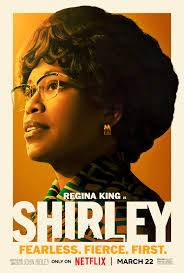
SHIRLEY
US, 2024, 117 minutes, Colour.
Regina King, Lance Reddick, Terrence Howard, Lucas Hedges, Michael Cherire, Brian Stokes Mitchell, Christina Jackson, Andre Holland, Dorian Missick, Reina King, Amirah Vann, W. Earl Brown.
Directed by John Ridley.
Shirley is Shirley Chisholm. She is a significant American personality from the 1970s. American audiences will respond to this portrait of her and her political campaigns. Audiences from outside the United States may be surprised to learn about her.
Some googling would be helpful. And, the television series, Mrs America, dramatising the Equal Rights movement in the United States in the 1970s features her as one of the protagonists. Shirley Chisholm was an African-American.
Regina King, Oscar-winner for If Beale Street Could Talk, gives a forceful performance as Shirley Chisholm. She is first seen campaigning to enter Congress, with captions indicating how few women, let alone black women, have been in Congress. She campaigns. She wins. She wants to have her say, the Democrat leader relegating her to a minor portfolio. She has to learn that there are steps in political rise.
But the action moves on quickly, groups urging her to stand for the presidency. For non-Americans this may be quite something of a surprise. In fact, she stood, a Democratic contender, in the 1972 election which eventually re-elected Richard Nixon.
While the film serves as a portrait of Shirley Chisholm, the focus is more on her campaign, her relentless commitment, her policies, social justice issues, meeting people, persuading protesters that they can achieve more through political involvement, even having a meeting with Huey Newton, leader of the Black Panthers and his urging support. One of the of the Democrat contenders was the governor of Alabama, the notoriously racist, George Wallace, an assassination attempt on him and Shirley going to visit him in hospital.
There is the quiet support of her husband of 19 years, Conrad (Michael Cherire), the wise advice of political guru, Mac (Lance Reddick in his final performance), Finance manager Arthur (Terrence Howard), young legal impressive physical enthusiast, Peter (Lucas hedges) and various collaborators as well as the hired campaign manager who eventually quits in desperate exasperation.
The film takes us inside campaigns, the pressure, the demands, backroom deals, counting numbers, persuasion, disappointments, betrayals.
There has been an African-American president of the United States, Barak Obama. And there has been a black vice president of the United States, Karmila Harris.
- The title, audience expected to recognise it? Audience knowledge of Shirley Chisholm? American knowledge? Beyond the US?
- The true story, the 1970s, the aftermath of the 60s, the Vietnam war, Richard Nixon, the 1972 election, the candidates, the Democrats against Nixon? Shirley Chisholm, Congress, her decision to stand, her campaigning?
- Introduction to Shirley Chisholm, Regina King’s performance, strong personality, 19 years married to Conrad, his support? Her political activities? Race issues? African-American? Within the decade after the March on Washington? Groups, women, support? Her feminist attitudes and stances? (And the collage of clips from feminists like Betty Frieden, Gloria Steiner and…)
- The campaign for Congress, support, her victory, with a group of new members of Congress, the photo, the few women (and the statistics about women, black women)? In the Congress, the allotment of the portfolio, rural issues, her reaction, the confrontation with the leader of Congress? Her impatience, her demands, advice for her to be more moderate?
- The decision to run, Congress, her determination, relationship with Mack, his advice, the relationship with Arthur and his fundraising, her relationship with her husband, Conrad? Her interest in Robert, his legal studies, political career, knowledge of youth politics, his being employed? The hiring of Stanley Townsend? His professionalism, know-how, practicality?
- The personalities of the advisers, in themselves, in relationship to Shirley, in the advice given, in the ups and downs of the campaign, her agreement, her rejecting, Townsend and his exasperation, eventually going?
- Shirley and her relationship with her husband, his devotion, 19 years, support? In the background? Feeling exasperated? The stand-off between the two? (And the information of the later divorce – and her marriage to Arthur and it being long-lasting?)
- The family situation, the sisters’ presence, criticism, relationship with their mother, churchgoing, memories of the father favouring Shirley? Surely reaching out but her hard personality? Mother and daughter watching the television, the phone call, the reconciliation?
- The various stages of the campaign? The energy, the meetings, the television interviews, the assessments of her opponents, the focus on George Wallace and his stances? His being shot, surely visiting him in hospital, advised against, the criticisms, especially from the African-Americans, the Black Panthers?
- Barbara, initial enthusiasm, with Shirley, protest versus political activity? Barbara, her involvement, working with Shirley, the link with the Black Panthers, setting up the meeting with Huey Newton? The discussions, arguments? His endorsement? Diane Carroll being the intermediary, her mansion, support of Shirley, the meeting?
- The issues of various states, her focusing on Florida, California and the winner taking all the votes? The character of Ron and Dylan’s, support, California, pressures, his betrayal with his votes? Also Form true, campaigning, flamboyant, California, interactions with Shirley, his votes?
- The ups and downs of the campaigns, politicking behind-the-scenes, meetings, phone calls, deals? The ultimate betrayal of the numbers? Shirley, acceptance, determination?
- The criticism of the film as not delving into Shirley’s personality more strongly, with Nuance? The focus on the campaign and the events and the issues?
- The significance of Shirley Chisholm, a black woman, politician, Congress, standing for Congress and for the presidency at such a period?
Ryuichi Sakamoto: Opus
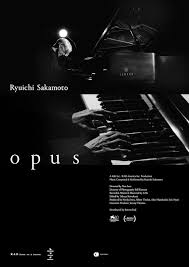
RYUICHI SAKAMOTO: OPUS
Japan, 2024, 103 minutes, Black-and-white.
Ryuichi Sakamoto.
Directed by Neo Sora.
Here is a documentary, a musical documentary, best viewed in a concert hall because, in fact, it is a piano recital on screen. For an individual audience, a small group, it would play well in streaming.
Ryuichi Sakamoto was a celebrated Japanese composer, musician and pianist. He composed a wide range of individual pieces and scored many films in Japan, features and short films, as well as internationally including his early work Merry Christmas, Mr Lawrence for Oshima, collaborations with Bernardo Bertolucci for the Last Emperor, The Sheltering Sky, Little Buddha. And, in later years, scoring the Oscar-winning The Revenant as well as the Japanese drama, one of his last compositions, Monster.
Diagnosed with terminal cancer of the throat, he decided to perform a piano recital for camera just months before he died in March 2023. His son was the director.
For those not familiar with the music of the composer and the recital of scores for films, sometimes the recital is unsettling. It is filmed in black and white (and so many reviewers and commentators have used the word “pristine”) camera focusing on the composer and his performance, close-ups of his hand and fingering, sometimes his pausing and using his hand and arm in the conductor fashion. And the camera moves across the piano, across the room, a variety of angles, a whole range of black-and-white visual compositions.
The film begins very slowly, quietly, the camera at the pianist back, gradually moving towards him, gradually revealing his face, his hands, his playing. While the focus is on the composer and his range of compositions, the film offers something of a masterclass in black-and-white photography and composition.
Sometimes the health of the pianist is precarious, sometimes he is asking for a break, commenting that his playing was not quite right, doing it again. However, with the close-ups on his face, on his white hair, his comment features, this film offers a visual portrait of Sakamoto as well and is a final collection of his compositions.
Perfect Days
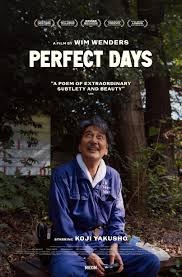
PERFECT DAYS
Japan/Germany, 2023, 124 minutes, Colour.
Koji Yakusho, Tokio Emoto,
Directed by Wim Wenders.
A new dawn, a new day, a new life… For me… And I’m feeling good - the lyrics of the Leslie Bricusse and Anthony Newley song, repeated throughout the film, but heard at quite some length at the end, the audience focusing on the benign face of Hirayami (Koji Yakusho in a wonderful performance) as he drives his truck on his way through the streets of Tokyo.
Here is a film about the goodness of human nature, kindness, human dignity.
Writer-director, Wim Wenders, has been making significant films for 50 years. He has had a special interest in Japan, making a documentary some years ago on the classic Japanese director, Yasijuro Ozu, and is paying tribute to him with Perfect Days. We are in the world of ordinary Japanese life, day by day, the vivid background of modern-day Tokyo, streets, high-rise, parks, diners, simple apartments. And, to the surprise of many audiences, toilets. For audiences who clean/have cleaned toilets, there will be a great deal of empathy with Hirayami and his day job, doing the rounds of Tokyo toilets, meticulous cleaning (even holding a mirror under a basin to detect any dirt), thorough. And this occupies most of his day – and a great deal of the first third of the film. We do become familiar, with him, with those toilets.
And he is content. He is a somewhat reclusive loner. No intimations of back story till the last part of the film. And, with his routines, repeated each day of the week, waking, folding bed and blanket, cleaning his teeth, opening the door, smiling at the sky, coffee from the vending machine, his truck, cleaning equipment, and on his rounds. There are some slight variations on his day off, especially to do his laundry. He has a sandwich in the park for lunch. He loves photographing the sky, the trees and leaves, watching characters in the park. He has a regular meal at a diner, returns home, and is an avid reader, shelves of books in his spartanly comfortable apartment. And the question as to whether he is on the spectrum with his meticulous regularity and detail.
There are other characters, especially his young associate who measures every experience out of 10!, cleans while looking at his mobile phone, his courting a girlfriend, needs money, overtures to Hirayami to sell his valuable collection of audiocassettes from the 70s and 80s. And then he quits.
Suddenly,Hirayami has a niece, running away from her mother who is alienated from Hirayami. Nor does Hirayami want to visit his now senile father. But, possibilities, as his sister does give the gift of his favourite chocolate.
So, Wenders shows great empathy for his character, a gentle Everyman figure, rarely speaking, somewhat more towards the end of the film. We cannot but help liking and admire him. And, music throughout the film, Japanese songs, English-language songs, Lou Reed, The House of the Rising Sun (in Japanese as well).
Cleaning toilets, quiet encounters with people, kindness, a regular life, books and music, each day is routine but a new dawn, a new life…
- The title and expectations? A Japanese story? German and Japanese perspectives on characters and stories? On the traditions of Japanese filmmaking?
- The career of Wim Wenders, movies, documentaries, many decades, international, interest in Japan, the films of Yasijuro Ozu, this film paralleling his films, a tribute to him?
- The importance of narrative? The important to focus on character? Action? Contemplation? Movies and experience?
- The musical score, the range of songs, English lyrics, Japanese lyrics, Lou Reed and his Perfect Days lyrics, Leslie Bricusse and Anthony Newley, a new world…?
- The presence and performance of Koji Yakusho? Age, appearance, serious, the smiles, reticent, speaking quietly under his breath, the later development and his communications? Audience interest, his being an enigma, audience appreciation of him? Goodness?
- The discipline of his apartment, bed, blanket and pillow, waking, the routine, each day, the smile, the sky, cleaning his teeth, the coffee from the vendor, his truck, taking his uniform? Repeated throughout the film – with some variations on his day off? The routine of his reading at night, his well stocked shelves, reading Faulkner, the Japanese essayist, buying Patricia Highsmith? Visiting the store, one dollar for a book?
- Audience response to his work as a toilet cleaner, the first half of the film and so much time spent in the toilets, Tokyo toilets and their being well appointed, his thoroughness, the detail, the mirror under the basin to detect dirt? Meticulous detail? The arrival of his co-worker, younger, casual, estimating everything out of 10, cleaning while looking at his mobile phone, music? Comparisons between the two?
- The simple life, satisfied, the routines? Relating to people, kindness? Bowing to people, to the shrine, to nature?
- The daily routine, the range of toilets, the customers, the children locked in, the little boy rescue, his mother not even saying thanks, the boy waving? Lunch, the trees and leaves, the sky? His always taking photos? The people encountered, the vagrant and his standing and movement, later seeing him in the street? The young girl sitting, eating the sandwich?
- The cumulative effect of watching Hirayami day by day? Audience questions about his back story, the young worker asking the questions for us, no answers? Hirayami always obliging, the young man, his girlfriend, to give her the lift, in the truck, playing the cassettes, the girl listening, taking one, later returning at and listening to it in the truck, weeping? The young man, the cassettes, going to the shop, their values, especially from the 70s and 80s? The young man asking for money, Hirayami giving it to him?
- Watching the behaviour of Hirayami, speculation about his past, his personality, his meticulous routines, the issue of his being on the spectrum? Sympathetically so?
- The effect of watching the toilet sequences, audiences who clean toilets identifying, audiences who have not had the experience puzzling about watching such detail? Hirayami as a very ordinary Everyman character?
- The other routines, the evening meal, the welcome from the staff, the drink, the food, the patrons watching the television, baseball? His continued returns? The older woman behind the counter, her welcoming him, the drinks, her singing at the House of the Rising In Japanese?
- The sudden arrival of his niece, the audience surprised to find he had a niece, the alienation from his sister? Her making herself at home, wanting to join him in the work, her discovery, sitting for lunch, the photos, the trees and leaves? Borrowing books?
- The significance of the photos, leaves and sunlight? The post-credits! And word for this kind of photography, interspersed throughout the film, dream sequences, at the end of each day, lines, shadows, black-and-white, some appearances of figures? Referred to as dream installations?
- His niece, alienation from her mother, her arrival, chauffeured, wanting her daughter home, the gift of the chocolate, memories of their father, in the aged care, his not wanting to visit his father? His niece always welcome?
- His associate phoning him, praising him, not turning up for work? The pressure on having to do the whole day shift by himself? Phone calls? Irritated? The next day, the woman arriving, rigid manner, the work?
- The enigmatic episodes to the end, the locked door, the restaurant and watching, the man and the woman, cycling away, the man coming to meet him, his explanations, terminal cancer, the shadows, the game of tag? The man ex-husband? The woman and Hirayami?
- Sharing the experience with him, an experience of human nature and goodness? The long focus on his smiling face of the end, driving his van, and the lyrics of a new dawn, a new day, a new world… For me, and I’m feeling good?
Godzilla x Kong: The New Empire
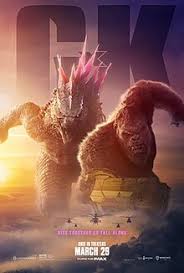
GODZILLA x KONG, THE NEW EMPIRE
US, 2024, 115 minutes, Colour.
Rebecca Hall, Brian Tyree Henry, Dan Stevens, Kaylee Hottle, Fala Chen, Rachel House.
Directed by Adam Wingard.
We need to check the title. In 2021, there was Godzilla vs Kong. Now, with a small letter change, we see that Godzilla and Kong art together, the “X” signifying that, if they do not necessarily love each other, they are now working together.
This is the continuation of a series of Godzilla and Kong films, a continuity in the plots. The first was: Kong: Skull Island, Kong re-emerging into our consciousness, and the discovery of the subterranean universe, Hollow Earth, and the young girl, the last of her tribe. The next step in the series was to focus on Godzilla – and Godzilla’s propensity for giant destruction. And then she’s too, the bringing together of the 2 giants in conflict. Now, peace between them in their coming to the aid of ordinary humans as well as the lost tribe.
The opening does not waste much time. We seem to return to the prehistoric world, monstrous creatures pursuing, Kong, literal cliff edge drama, and Kong’s infected tooth! Meanwhile Godzilla is running rampant in Rome, finally settling down to sleep and occupying the Colosseum!
Then back to the humans, Dr Ilene Andrews, Rebecca Hall, participant in the previous adventures, tTia, Kaylee Hottle, the little girl, who feels alienated at school. In the meantime, Trapper, Dan Stevens, is called with his multi-purpose plane, to hover over Kong in pain and extract his tooth and supply.a false tooth.
But, there are ominous signs. An expedition to Hollow Earth, including recruiting Bernie, Brian Tyree Henry, running his own pod cast, part of the previous expeditions.
Which actually means there is quite a lot of plot, the audience spending time with one, a lot of time with the next, and the next. There is Kong’s story, his discovering some rebel apes, including a little one who joins in the action, a variation on the Kingdom of the Planet of the Apes. Then there is the story of the tribe in Hollow Earth, quite an advanced civilisation, young Tia able to communicate, their being under threat by the apes, the veneration of the giant Mothra and bringing it alive again. Meanwhile, Godzilla has woken up in the Colosseum, submerged and travelling to the Arctic to replenish strength.
Whatever the communication, the next stop is Cairo, Godzilla doing some more trampling, especially on the pyramids, but Kong emerging, then making peace, Tia intervening, standing on the head of the Sphinx, and pact to join forces against the rebel apes.
It is a changed destruction in Rome and Cairo rather than in New York City, but the imagination stretches when, suddenly, they both turn up in Rio de Janeiro – more confrontations.
Bringing the 3 stories together means more action than we might have been anticipating, all in confrontation, a lot of bellowing from Kong, firebreathing from Godzilla, dangers for the humans, and Mothra joining in the attack.
It seems that this is a recipe for popular entertainment, fantasy and action, imagination, dangers and rescues, and considerable success at the box office. (A statistic: It is also the 38th film of the Godzilla franchise and the 13th film in the King Kong franchise.)
When and where will, in Godzilla combine again?
- The fifth film in the Godzilla-Kong series? Each film following the other? The establishing of the mythology of Kong and Skull Island? The mythology of Godzilla, size, power, destruction? The conflict between the two? This film bringing them together against common enemies?
- Audience response to the presence of Kong over the decades?
- The opening, Kong, the pursuit by the creatures, the prehistoric atmosphere, the creatures flying? The fight, the cliffs, the injury, the infected tooth? The tracker, called on by Ilene, the episode of extracting the tooth, the false tooth? Kong as friendly?
- Godzilla, the rampage through Rome, destruction, people, his settling in the Colosseum?
- Audience response to Godzilla? The Japanese background? Two giant creatures, relationship with humans, threats, connections, collaboration?
- The opening, Ilene Andrews had her work, her daughter and the background of her being mute, from the destroyed race? Hollow Earth? The research, financial difficulties? The sightings, the graphs, Tia, at school, the fantasies, drawings, Ilene’s concern? The linking of her drawings with the graphs?
- Trapper, adventurer, personality, skills, extracting the tooth, pilot and plane, the journey, his contribution to the action?
- Bernie, presence from the other films, technical knowledge, his podcast, his manner? Contact by Ilene? His wanting to go on the expedition? The pilot and his rough manner? The voyage to Hollow Earth? The post-deserted, the pilot swallowed by the tree? Atmosphere of fear?
- The time given to the story of the tribe, the sinkhole, being discovered, empty feeling at home, communication, the civilisation of the tribe, the buildings, the hieroglyphs? The role of Mothra? The threat by the rogue apes?
- Kong and discovering the rogue apes, the small ape, the conflict and fights, conquering, the invasion into the territory of the tribe?
- Godzilla, leaving Rome, going to the Arctic, replenishing powers? Being tracked? The Egyptian sequence, rampant through Cairo, the destruction of the pyramids, Kong emerging, conflict, teaming together, Tia appearing? On the head of the Sphinx? Control? The arrival of Mothra?
- Mothra, the mythology, in the underworld, being revived, coming to the rescue, saviour?
- The final confrontation and battle, the apes, the little lake helping,, the Titan and collaboration, Kong versus the Skar King, Godzilla and the destruction?
- Peace restored, the tribe safe, tear and her wanting to stay with Ilene? On and his leading the kingdom? Godzilla returning to the Colosseum?
Aristotle and Dante Discover the Secrets of the Universe
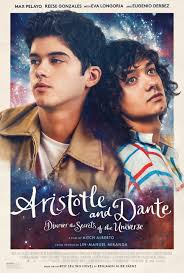
ARISTOTLE AND DANTE DISCOVER THE SECRETS OF THE UNIVERSE
US, 2023, 98 minutes, Colour.
Max Pelayo, Reese Gonzales, Veronica Falcon, Eugenio Derbez, Eva Longoria, Kevin Aleandro, Marlene Forte.
Directed by Aitch Alberto.
One of the longest titles! Intriguing, perhaps? Pretentious for others, perhaps? And bypassed audiences who are not into philosophy and literature!
This is not a venture back into the classics. We are in El Paso, Texas, 1987. Aristotle, Ari to his family and friends, is the narrator. He is 16, quite a loner, a sparse room at home, alienated from his father (Eugenio Derbez), bonding with his mother (Veronica Falcon), but better because his older brother has disappeared and his parents refuse to talk about him. He should have learned to swim but, one day at the pool, he encounters the very friendly Dante. They instantly click with each other, Dante persuading him to trust him, to float, to swim. Dante has wealthy parents, his father an academic. They are both from Mexican families.
This film is based on a Young Adult novel which proved very popular. Those in the know from the novel are aware of where the friendship is leading. Those not familiar with the novel will suspect that it is going to be coming of age, emerging awareness of sexual orientation, of relationships.
It is Dante who is really aware of his inner self, his orientation, his sensibilities, an artist, his sensitivities. Ari, on the other hand, does not relate well to many people at all, the girls at school included. But, the two enjoy their company, are welcome in each house, Dante inviting Ari to come with his parents to the beach camp, with a telescope, studying the stars in wonder, pondering the secrets of the universe.
Complications arise when Dante’s father gets a teaching job in Chicago, to be away for a year. There is a dramatic moment when Ari saves Dante’s life by pushing him away from oncoming reckless car. The screenplay then turns to letter writing, Dante very honest, inquiring, talking about kissing a girl, acknowledging his orientation. Ari is not such a good letter writer, values Dante’s letters, is at home, working in a burger joint, encountering a friendly girl who kisses him.
Then, the family arrive back for the summer break, Dante being honest, Ari reacting badly, Dante being bashed in the street, and Ari confronting his parents to discover what happened to his brother. There are happy moments for Ari, especially when his aunt visits, exuberantly praising him, but sadly dying.
There is a moving scene when Ari finally talks with his father, encouraged by his father to be himself, some hope for the future. A symbolic ending with the two boys on the back of a truck gazing at the stars, having discovered the secret of their own universe. For teenage audiences, whatever their orientation, as well as for parents to understand these questions and the effect on their children.
1. The title and expectations? The classic names? Philosophy, poetry and the universe?
2. Based on a Young Adult novel? The characters, the intended audience?
3. Texas, El Paso, the 1980s? Mexicans in El Paso, adapting to the US, Mexican traditions? Spanish language, English language? Accepted, not accepted?
4. Ari’s story, his voice-over, at 16, Mexican background, relationship with his mother, more tender, difficulties with his father, the story of his older brother and the secrecy? A loner, expressing his views, keeping to himself, at home, at school, no friends, not learning to swim, at the pool? The first encounter with Dante? Friendly, teaching how to swim, the trust, the bonding? The ability to talk with each other, share time, Dante visiting the home presenting the Mexican art book? Ari visiting Dante’s home, his parents, going on a camping trip? Accepted as part of the family?
5. Audiences knowing the gay themes and watching the developments of the characters? Audiences not knowing, intimations, development, denial, truth? Love? The secrets of the universe?
6. Dante, his academic father, the camping and the telescope, the stars, contemplating the stars? Dante’s room and its being a mess, the austerity of Ari’s room? The move to Chicago, the farewell? Dante and his letters, only not writing back so much, the issues arising, the issue of masturbation, the kissing the girl, Dante’s confession? Ari’s reaction?
7. Ari, interactions with the girls, their curiosity, sending them off? The young woman signing his cast? Meeting with the party, the kiss, his reaction?
8. On the road, the turtle, Dante, the car, Ari pushing him to safety, Dante’s injuries? Ari in hospital, chin, leg in a cast?
9. Ari’s birthday, the gift of the truck from his father, attempts to communicate with his father? Relying on his mother? His generally surly entrance into the home? Eventually asking for the truth, being overwhelmed by the truth, not being happier for knowing about the violence of his brother, his outbursts, killing the trans prostitute?
10. Ari’s return, the bond between the two, the truck, watching the horizon, talk? Dante and his wanting to talk about his orientation, the kiss, the kiss with Ari, Ari and his violent reaction? Dante, his being brutally bashed, hospital? Ari’s visit? The confrontation with the other boy, the identity of the attackers, going to Julian, the brutal outburst, the blood on him, coming home, repeating the pattern of his brother?
11. The importance of his aunt, her love for him, always praising him, enjoying his company, her death, the grief, his mother going to the home, the revelation about her being lesbian? Difficulties for the family? Ari and his acceptance? His eyes leaving him a house in her will?
12. The frank talk with his parents, with his father, their acknowledging his loving Dante, helping him to understand? The return to Dante, the kiss, acceptance?
13. The lyrical ending, fantasy, the back of the truck, floating the stars, in the middle of the secrets of the universe?
Before Dawn
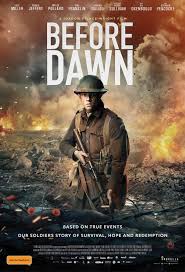
BEFORE DAWN
Australia, 2024, 99 minutes, Colour.
Levi Miller, Travis Jeffery, Ed Oxenbould, Myles Pollard, Stephen Peacocke, Oscar Millar, Pat Kelly Belinda Hammond.
Directed by Jordon Prince-Wright.
The past is often powerfully present to us. And we can understand ourselves better in the light of the past.
This is a presupposition for the continued cinema visits back to Australia’s War past. And the Anzac motto, “Lest we Forget”.
Young director, Jordon Prince-Wright, has dedicated this film to his granddad. While he is re-visiting stories often told – and we remember Gallipoli, The Lighthorsemen, Beneath Hill 60 – this is a very personal telling of Australian involvement in World War I, in France, on the Somme, the Hindenburg line and other key battle fronts from 1916 to 1918 and the Armistice.
The tone of the film is set before the credits, the darkness of the trenches, dirt, the rats, the atmosphere in which the men had to spend years. Then to a farm in Western Australia, Jim Collins (Levi Miller) working with the sheep for his father, mates with the coworkers. They are intending to go to war, eager to sign up. They want Jim with him. His father and mother don’t want him to go, the threat to managing the wrecked farm. Jim is caught but decides to go. It is 1916.
As with so many striking war films, it is amazing to see how the battlefield is reconstructed, detailed presentation of the trenches, the glimpses of the battlefields and the soldiers going over the top, attacking German posts, the men being shot down, the hand to hand combat all convincing here.
Jim is young, he has to come of age in the trenches, lose close friends, be blamed when friends are killed, personality clashes and how to deal with them, the role of the authorities, some condescending, some altering their reports out of care for the young soldiers, and the proverbial sergeant who bonds with his men, is not only a leader but something of a father-figure, sharing the crises and the action with them.
Jim is a good young man, conscientious, and shows some heroism, especially going over the top to rescue an injured man and drag him to safety. And the film indicates that this is the kind of experience that the young soldiers brought back home, if they survived, a spirit of mateship in a war that they did not necessarily understand, that was confined for years in a limited area of France. The Anzac spirit.
This is an early feature film from the director. Given the aplomb with which this film was made, it will be interesting to see his future films.
- Australian perspective on World War I, the fighting in France, 1916 -18, the trenches?
- Perspective on World War I, after more than 100 years? Recapturing the life of the young men at home, on the farms, their enthusiasm, and listing, finding themselves in France, the Somme, the Hindenburg Line, the bonding, the fighting, the mud and rats of the trench, serving up the food, the rain, time passing, the wounds and injuries, the months, the years?
- The West Australian settings? The farm, the sheep, the dam, the home? The hard work of the parents? Making ends meet? The tough father? Hard on his son? The young daughter? The mother, the reporting dirty boots in the house? Jim, his age, the work, the friendship with the group, Don, Thomas Nickles, memories of the past? The newcomers, Archie? Jim and his decision to go with the group, the hesitations, the final words from his father, the desperation for the farm, something of his father’s blessing? The sad news received when his father died?
- The picture of the warfare, the detail of life in the trenches and its hardships, the German enemy, seen and unseen? The bombardments? Going over the top? The men being killed and the attacks? The men to be rescued and brought back to the trenches? The dilemmas about leaving injured men? The dangers, the heroism?
- The picture of the authorities, their visiting the trenches, some sense of superiority, issuing orders? The interviews with the officer?
- The sergeant, his personality, authority, with the men, companionship, understanding, making judgements for the situations, following orders?
- The years and their effect on Jim, initially young and naive, collaborations, Don, the friendship from the past, his going over the top, his death? Nickles blaming Jim? The fights, cantankerous? Eventually Nickles being wounded, Jim and his support? Their surviving?
- The detailing of the young men, their personalities, friendships, dangers, deaths? Archie, young, fears? Winding?
- The passing of time, the months, then the years? The effect of such a long warfare, the life in the trenches? The confrontation with the Germans, attacking the posts, grenades, hand-to-hand combat, the killing of the Germans? The effect on the men?
- 1918, Armistice Day, the silence after the guns, the checking of the time, the relief, the joy, the comradeship?
- Jim, his return home, his sister, his mother, his father’s grave?
- The director dedicating the film to his grandfather? A reminder of the impact of the men going to war, the many deaths, the legacy of the war on Australian society?
Io Capitano

IO CAPITANO
Italy, 2023, 121 minutes, Colour.
Seydou Sarr, Moustapha Fall, Issaka Sawadogo.
Directed by Matteo Garrone.
A film that needs to be seen.
Audiences all around the world have experienced refugees, asylum seekers, trying to come to their country, especially refugees at the mercy of people smugglers. For years there have been images of boats capsising in the Mediterranean, journeys from Libya, hopes for reaching Italy. And, during the 2010s, the many stories, in fact, the many films, featuring the refugees from Afghanistan, Syria, again reaching the Mediterranean, attempts to reach Greece, difficult treks through Europe, borders barriers, hostile reception, racism.
But, there have not been so many films about the refugees and their journey through the countries of North Africa to get to Libya, to make that journey across the Mediterranean.
The two central characters, cousins, age 16, at school, doing odd jobs to get money for their passage to Europe, Seydou and Moustapha, using their actual names never having acted before (which makes their performances all the more credible and persuasive), have dreams of life in Europe, in Italy. The mother does not want them to go but they go to get a passport, from the people smugglers, and a perilous journey begins.
The early part of the film does show life in Senegal, school, family, hard work, and the desire for something better. But, the central part of the film shows the journey – and it is definitely not better. The hopeful refugees are bundled into vehicles, crammed, at one stage on the back of a truck bouncing on the dunes, someone falling off, the convoy driving off, the falling man abandoned. At times, the desert is no place for any vehicle and the group have to trek for days, a relentless guide leading them, some collapsing, especially a woman whom Seydou tries to help, but the group has to go on (and, revealing his character, a dream fantasy where he goes back to rescue the woman and she is able to fly to safety).
The trek takes them inland from the Senegalese coast to the border with Niger, payments to corrupt officials, through the desert then to the Libyan border. But the Libyan border has been a false hope. By this stage, the group is weary, even the two young men. And, as we have travelled with them, we are weary, upset, concerned for them. And worse is to come,
Again the border guards are corrupt, checking passports (with full state two years earlier but the guards noting that the boys are wearing the same clothes now as in the passport), demanding money, Moustapha arrested and taken away. Then over the operations of the Libyan Mafia. Seydou is also taken, imprisoned, tortured because he has no money. But, a saving grace, an order refugee, Martin, encouraging Seydou, tending his wounds, volunteering when builders are asked for and nominating Seydou.
Some respite as the couple build a wall, the commission to build a fountain in the grounds of the desert mansion, and freedom to leave. There is more to come, Seydou doing jobs but searching for Moustapha, finding him, approaching the people smugglers and their still dreaming of life in Italy.
One aspect of the story of the boats on the Mediterranean is the smugglers getting the youngsters to steer the boats, perhaps more tolerance of the boats by the Italian Coast Guard. Which means then that Seydou after brief instructions about gears and guidance, is the Captain, Io Capitano. Some exhilaration for him but also a great discovery of responsibility, passengers, pregnant woman, Moustapha and his wounded leg, passing the lights of oil rigs, and eventually the Italian coast.
The film ends. We have shared the journey. And we know the hardships that the entry into Europe will bring.
1. A topical film? The 2010 this? The 2020s? Migrants on the move around the world? From Africa to Europe?
2. The settings in darker, life in Senegal, the city, homes, families, all conditions, crowded houses, boys and labour, school, collecting money for the trip to Europe? The dream of Europe?
3. The establishing of the characters, Seydou, leadership, Moustapha, cousin, supportive? Seydou at home, asleep, his sisters, his mother, working on the building site, going to school, testing out his mother about leaving, her harsh reaction? Counting the money? Moustapha, age, enthusiasm?
4. Decision to go, the religious consultation, the rituals, the shaman, his approval? Getting the passports, the big lineup, rapidity, the photos, the money, later the lie about the date of the passports and their wearing the same clothes?
5. Leaving, the vehicles, the characters of the people smugglers, exploitation?
6. The trek, the terrain, from Senegal inland, through Mali, to the border with the Niger, the treatment, the hustling, checking, the trucks, the drive through the desert, bouncing, the man falling off the truck and abandoned, the lady who could not go on, Seydou’s return, trying to help, the dilemma, Moustapha urging him, his later dream about helping the woman to fly?
7. The Libyan border, the police, searching for money, Moustapha and his inserting his money in his body, his arrest, imprisonment?
8. The Libyan Mafia, taking the refugees prisoner, the torture and details, Seydou, the others hanging? In the cell, the crowds, Seydou and his exhaustion, taken pity on by Martin, Martin and his back story, the appeal for builders, Martin volunteering but taking Seydou? Into the building site, the food, some accommodation, building the wall, the manager, the issue of building the Fountain, must of freedom, the work on the Fountain, it being accepted?
9. Seydou, Martin, in Tripoli, Martin having to leave, going to Italy? Seydou’s gratitude, his saving his life? Seydou, work, continuing to search for Moustapha, eventually finding him, Moustapha having been shot, the doctor and the injection, the barber and his drugs? The doctor advising that they needed to go to Italy?
10. Seydou, the people smugglers, not enough money, the smuggler and his suggestion that Seydou guide the boat, the boat itself, the explanation about the gears of the engine, Seydou and his diffidence, yet wanting to help, time for Moustapha? The crowds on the boat, discovering the men in the engine room, the pregnant woman, the crowds, water, atmosphere?
11. Seydou, guiding the boat, high hopes, Moustapha assisting him, the oil rig, the lights, continuing on, Seydou and the crisis, controlling the people, the birth of the child? At the wheel, declaring that he was the captain, that it was saving people? Sighting land, the helicopter, the birds flying?
12. Seydou, the achievement, the long close-up on his face, the Captain?
13. The film of contemporary issues, Italian directors and his perspectives, the stories he had heard, his career, the cast and their first films, convincing, struggle, humanity, venturing into the unknown, naivete, the future?
American Fiction
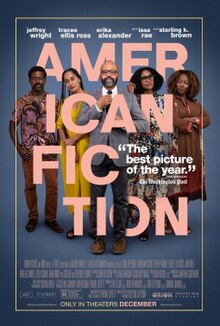
AMERICAN FICTION
US, 2023, 117 minutes, Colour.
Jeffrey Wright, Sterling K.Brown, Issa Rae, Erika Alexander, Tracee Ellis Ross, John Ortiz, Leslie Uggams, Adam Brody, Keith David, Myra Lucretia Taylor, Raymond Anthony Thomas.
Directed by Cord Jefferson.
Quite a generalised title and audiences will have their own ideas of what American fiction is, whether they like it or not. With this humorous, satiric story, there is a lot to like, as well as a great deal of disapproval!
American Fiction was nominated for five Academy Awards, including Best Film, Best Actor, Best Supporting Actor, music – and winning for Best adapted screenplay by the director, Cord Jefferson. So, quite some standing amongst the American films of 2023.
We are introduced to Thelonious Ellison (and his nickname, Monk, after the musician). He is played by Jeffrey Wright, Oscar nominee. He lectures at the University, has written books, can be a stuffy academic, disdainful when he listens to a reading by a successful novelist, using the language and jargon of the streets to illustrate African-American life. He thinks that this is destined to appeal to the consciences of one people.
Monk is alienated from his family, though bonding with his sister who, sadly dies. His mother is becoming senile and the issue of the aged care. His plastic surgeon, gay brother, Oscar nominee Sterling K.Brown. Which brings him back to his family life, not very happy about it, but very attracted to Coraline who lives across the street, beginning a relationship with her. But she will feel the effect of his crankiness.
And, Monk is cranky with his publisher, upset at lack of progress with his own books, then getting the mischievous idea to write an anonymous parody of the kind of book he loathes. They create an anonymous author, a former prisoner, background, not well educated… And, his dismay when publishing agents enthusiastically praise the manuscript, huge advance payment, want instant publication, Hollywood after the film rights. And his surly assertion for a four letter title – which is accepted.
And his friend likes the book, praising it, furthering his crankiness.
He is also a member of a book judging committee, having discussions with the author of the book he loathed who makes some interesting comments about his, not knowing he was the author. The publishers then enter his book into the competition and, of course, in a climax scene at a banquet, he is the winner.
Tongue goes firmly into cheek for the final part of the film, the discussion with the Hollywood producer, discussions about all kinds of possible endings – which are visualised for us. But, will Monk succumb to success and popularity, or…?
And for non-Americans, enjoyable to see Americans sending themselves up!
1. The focus on American literature, American fiction, Afro-American fiction, serious, popular, academic interpretations,?
2. The opening, introducing Theolnious Ellison, nickname Monk, age, endemic position, lectures, attitude towards literature, discussions with the students, Flannery O’Connor, the discussion about the word “negative”, student walking out? The discussion with the Dean, complaints against Monk, his going to Boston, attitude towards his family, suggested that he take time off? The prospect of his new book? His past books, academic, well reviewed, not red?
3. Monk going to Boston, meeting Lisa, revelations about the past, his father’s favourite, the rule of his father, doctor, Lisa and Clifford being doctors, going to visit their mother, her presence, personality, beginnings of senility?
4. The panel, the few people attending? Hispresence at Sentara Golden’s reading, the acclaim, standing ovation, his puzzle, her book, the title, popular African-American language, content?
5. Lisa, her collapse, her death, the funeral, their mother, Cliff arriving, is attitude, from Phoenix, plastic surgeon, the clashes with Monk? The issue of his sexual orientation, marriage breakup, lover, whether his father knew? His mother’s saying she was glad he was not gay?
6. Monk and is meeting with Arthur, promoting his books, the conversation, is one and his exasperation with the popular literature, for black audiences, for white audiences, their sense of guilt, feeling the need to read such books, their interpretation?
7. His decision to write the book, imagining the situations, the confrontation between the characters, their asking him for advice, setting up the situations – a quick device for establishing the writing of the book? Taking it to Arthur, his reaction? The decision to send it out? The publishers, their acceptance, rave comments, the huge money advance, the impact on Monk, the phone calls, the PR buildups, Arthur urging Monk to assume the author’s character, tone of voice, vocabulary? Monk and his hesitation? Decision for it to go ahead? The film offer? The meeting with Wylie, the false background, his being a fugitive, prison sentence, telling his story on his own style?
8. The complications for monk with his mother, Lisa having helped, money issues, Cliff not having money, the reliance on Lorraine, her devotion to the family, to Agnes, to Monk? Maynard, the police, the past friendship, Lorraine and Maynard as a couple, the proposal? The visits to the aged care home, Agnes’s reactions, moving in, emptying the house, souvenirs for Lorraine? That they would movie in after the wedding?
9. Monk, the encounter with Coraline, helping with the groceries, her ex-husband, the growing friendship, conversations, her having read his books, the relationship? Her coming to meals, the across the street? The bonding? A humane outlet for Monk?
10. The publication of the book, the issue of the cover, the issue of the title, Monk and his proposing Fuck, initial reactions, the decision? The publication, the acclaim, popularity, sales? The film rights? Wylie, the meeting, the ambulance for his mother, rushing out, wildly interpreting this is his apprehensive is about the police? Adding to the credibility?
11. Coraline reading the book, Monk and his negative reactions, the clash?
12. The competition, the request to Monk to be on the panel, Sentara Golden on the panel, the other members, white, the range of books, discussion about reading the first hundred pages? Sentara and her dislike of Fuck? Monk warming to her, but the clash and the argument?
13. The buildup to the awards, the invitation to Coraline? Announcing the winner, the acclaim?
14. The ending of the film, creative fiction, one going to the podium, taking the trophy, but the variety of possible endings, discussing them with Wylie for the film, speculations? Acceptance, Coraline, the speech, the reconciliations all round, the speculation that the police had identified the author, fugitive, the police invasion, the shootout?
15. The serious dimensions about American literature, images? The satirical take on American fiction?
Sisi & I
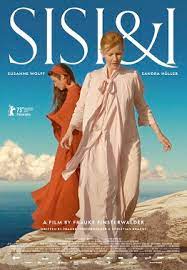
SISI & I
Germany, 2023, 132 minutes, Colour.
Sandra Huller, Suzanne Wolff, Georg Friedrich, Marcus Schleinzer, Anthony Calf, Tom Rhys Harries, Sybille Canonica, Stefan Kurt, Angela Winkler, Annette Badland
Directed by Frauke Finsterwalder
Sisi is the well-known and affectionate nickname for the Empress Elizabeth of Austria, Countess from Bavaria, married to the Emperor, Franz Joseph, Empress for four decades, whose son, Rudolf, was part of the murder-suicide pact at Mayerling.
Famous in her day, she has been the subject of theatrical dramas, television series and, from silent times not so long after her death, the focus of many films. In the mid-1950s, she was famous as being portrayed, young, by Romy Schneider in a trilogy of films. In more recent times, she was played by Vicki Krieps in Corsage. And, now, she is played by German actress, Suzanne Wolff.
However, the central character here is the Countess Irma, a Hungarian unmarried member of royalty, pressured by her dominating mother, auditioned as a companion for the Empress. In fact, Countess Irma was companion for the last four years of Elizabeth’s life, 1894-1898 when the Empress was assassinated by an anarchist.
The screenplay is a dramatisation, taking many cues from Elizabeth’s life, personality, manners, but treating them fictitiously, often with tongue-in-cheek. And this is compounded by the musical score, the range of 20th and 21st-century songs and their lyrics, something of a juxtaposition between what we hear and what we see.
Susanne Wolff’s haughtily regal as the Empress. But, this is Sandra Huller’s film, coming at the time of her great success with The Zone of Interest and Oscar nomination for Anatomy of a Fall. The film has a very strong supporting cast and some character actors for the episodes in Britain.
The setting is Corfu, the Empress separated from the Emperor, residing there, a houseful only of women, several fussing around her, and references throughout to her diet regime, considerations of health and weight, exercise, making demands on Irma. There is a visit from her effete cousin, Victor, a visit from her husband, discussions about the relationship, sexual issues, his sexual attack on her and the repercussions.
Malta stands in for Corfu and other locations, a visit to England and a meeting with Queen Victoria, the culmination in Switzerland. There is great attention to sets and decor, costumes.
Interesting in itself but also interesting when seen alongside the other versions of the Empress Elizabeth.
- The title, the focus on the Empress, her nickname, popularity, affection? The Countess Irma, her background, Hungary, pressurised, auditioned, her companionship, her love for Elizabeth?
- Audience knowledge of the Empress Elizabeth, from theatre, television, films? The image built up over the decades about her? Her actual life, from Bavaria, young, the pressure from her mother, marriage when young, mother when young, relationship with the Emperor, moving away, living in isolation, travelling, favouring Hungary? Her assassination?
- Irma, with her severe mother, the audition, her not marrying, being accepted as companion, her age, manner, manner of dress, the travel, difficult, hungry, needing a wash, but the immediate demands made on her for exercise, weights, diet, keeping her hungry? The reaction of the young attendants around the Empress, confidential, giggling? Irma and the immersion in this world?
- Costumes, décor, 19th-century elegance, pomp, aristocrats, self-absorbed, attitude towards servants, households? Class and snobbery? The musical score, the contemporary songs and lyrics, counterbalance to the 19th century opticals?
- The court, Corfu, the beauty, the coast, the hiking? The count and his attendance? Elizabeth disdain? The young women and their fussing and giggling? Irma finding her place, summoned into action, to hike, dressing, her own dresses burnt, the Empress dictating her lifestyle?
- The visit of Victor, his manner, theatrical, gay sensibility, flirtatious? His later return and care for Elizabeth, the final make up, urging her to come alive again?
- The visit of the Emperor, their separation, his attitude, his requests, sexual relationship, his demanding she go to Switzerland, his aggressive sexual attack, his departure, the consequences for her?
- The issues of exercise, fanaticism, weight, height, strict corsets, particularities of diet? The demands on Irma? The later sequences, Elizabeth persuaded to eat, her enjoyment of what she had given up for years, the effect?
- The four years for Irma, love for Elizabeth, intimacy, Elizabeth’s reactions? Keeping her distance while asking Irma to express her love and devotion?
- The visit to England, the country estate, the nobleman and his welcome, Smythe, the stables and horses, looking down on Elizabeth, the rivalry in the race, the growing intimacy, her wilfulness, deciding to leave, abandoning him? Irma and her observing the relationship, disapproval?
- Going to Switzerland, the more relaxed way of life, Elizabeth and the prospect of life and death, Irma and the knife, the embrace, the attack of the anarchist, Elizabeth wounded, dying? Irma in attendance?
- A particular portrait of the Empress Elizabeth?
Little Italy
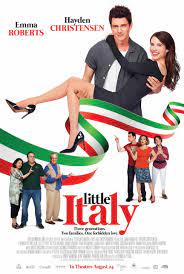
LITTLE ITALY
US, 2018, 102 minutes, Colour.
Emma Roberts, Hayden Christensen, Danny Aiello, Andrea Martin, Adam Ferrara, Gary Basaraba, Alyssa Milano, Linda Kash, Vas Saranga, Amrit Kaur, Jane Seymour, Andrew Phung, Ava Preston, Nikky Capello.
Directed by Donald Petrie.
Little Italy is a Romcom, appealing to the Romcom audience, those not into it probably wanted to give it a pass.
In fact, it is everything that might have been expected from a romantic comedy set in little Italy. It has also been described as a food film, dismissed by experts in cuisine. It really is a pizza film – and at times you can almost smell and taste pizza .
So, there are two families, the little girl in one, Nikki, delighting to be in the company of the other family’s little boy, Leo. They are inseparable. However, there is a competition, a clash between the two fathers, enmities for the next 20 years, two separate pizza parlours, side-by-side, Leo’s family’s business flourishing, Nikki’s family not.
Then, Nikki, grown-up, goes to London to be educated in cooking and restaurant management, under the eye of Jane Seymour. But, after some years, she has to return home and prepare menus for a new restaurant.
A lot of the film is then about what happens when she gets home, now a glamorous young woman, encountering Leo who has faithfully stayed with the family even though he would have liked to have had his own restaurant, their initial encounter, playful, wary, drinking, some innuendo…
A range of character actors play the parents, two husbands and wives and their interactions, but a focus also on the grandparent generation, with Danny Aiello in one of his final films as Leo’s grandfather, and Andrea Martin (so extrovertedly Greek in the Big Fat Greek Wedding films) as Nikki’s grandmother. Secret dating, proposal, dinner for all, the announcement, and the fostering of the feud.
Nikki is emotionally bewildered, in love with Leo but refusing to acknowledge it. He is in love with her. However, to solve the feud, it is decided that the families enter the competition for that year, the younger generation because the fathers have been banished from the competition. And, whoever loses, will move out.
Lots of food and excitement with the competition, the cooking, the judging, Leo winning but realising that Nikki had manipulated the sauces with the intention of her losing and leaving.
Final drama at the airport, everybody there, interrupting all the procedures, Italian loud, love, resolutions – and reconciliations.
More or less what we would expect.